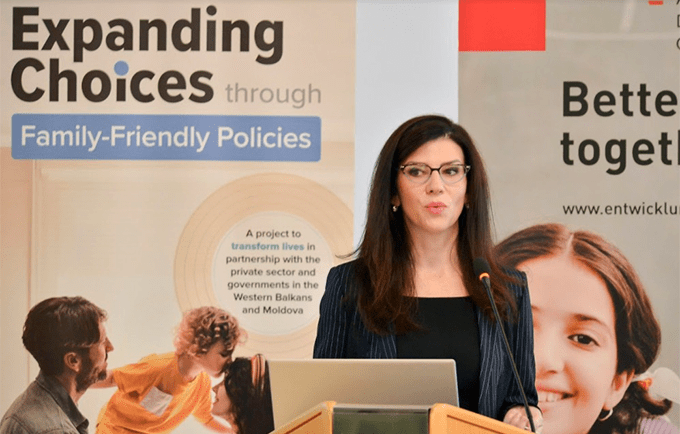TIRANA, Albania – The project “Expanding Choices: Gender-Responsive Family Policies for the Private Sector in the Western Balkans and Moldova” was launched today in Albania by the United Nations Population Fund (UNFPA), which brought together representatives of the public and private sector to discuss ways companies can promote policies that ensure work-life balance.
Flexible working hours, employee health programmes, breastfeeding facilities and restrooms for children on company premises are just some of the family-friendly practices in the workplace that the regional Expanding Choices initiative aims to realize on a wider scale. Within the scope of this project, UNFPA in Albania, supported by the Austrian Development Cooperation (ADC), will build the capacities of several companies that have agreed to take part in the project, collaborating on the implementation of more family-friendly policies and practices in the workplace.
Family-friendly policies adopted by governments and the business community in other countries have been shown to lead to an increase in the number of employed women, more active participation by men in household chores and caregiving, and other benefits for families and societies.
In his opening remarks at the launch, H.E Dr. Christian Steiner, Ambassador of Austria in Albania, stressed: “It is crucial that governments introduce policies that tackle gender inequality by creating the right conditions and incentives for women to work. The private sector is a key partner for addressing existing challenges and it is in the businesses’ own interest to create a working environment that is attractive to women. I trust that our cooperation with UNFPA will significantly contribute to establishing family-friendly workplaces and therefore more gender equality in the Western Balkans region and the three priority countries for the Austrian Development Cooperation.”
Gender-discriminatory stereotypes and norms hinder women’s active participation in the labour market and social life, and discourage men from becoming more widely involved in childcare. The Labour Code of the Republic of Albania contains some instructions for the regulation of flexible working hours or maternity and paternity leave, however the final decision on these matters remains at the discretion of employers.
In Albania, women spend seven times more time than men on unpaid caregiving and chores at home.
“We in the Ministry of Finance and Economy are aware that – despite the good steps taken to improve childcare and women’s employment – education, vocational and professional training, social support, and accessibility of public services and employment are still some of the main areas in which we should invest more to achieve our social agenda objectives,” said Mrs. Dajna Sorensen, Albanian Deputy Minister of Finance and Economy, a key partner of the project.
UNFPA is exchanging views with a group of private-sector actors that are already implementing family-friendly practices or are interested in becoming collaborators as part of this project. Within the project framework, companies will benefit from guidance and training in expanding family-friendly policies and practices in the workplace.
In her presentation of the regional Expanding Choices programme, Ms. Nigina Abaszade, UNFPA Country Director for Albania, emphasized that “All efforts from our side will focus on introducing family policies that would give both women and men the choice to combine work and family responsibilities. These policies must prevent unintended consequences, such as hindering women’s career path, and they have to be designed in such a way to actively encourage fathers to be part of raising a family and sharing caregiving responsibilities.”
For more information, please contact:
Fiorela Shalsi, Project Officer for Albania, shalsi@unfpa.org
Elsona Agolli, Gender and Population and Development Programme Analyst: agolli@unfpa.org



